Related Research Articles
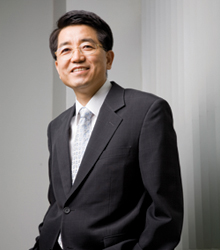
Taeghwan Hyeon is a South Korean chemist. He is SNU distinguished professor in the School of Chemical and Biological Engineering at Seoul National University,director of Center for Nanoparticle Research of Institute for Basic Science (IBS),and an associate editor of the Journal of the American Chemical Society.

Noh Tae-won is a South Korean physicist and director of the Center for Correlated Electron Systems (CCES) in the Institute for Basic Science (IBS) at Seoul National University (SNU). He has published more 400 papers and been cited 15,000 times. He is a member of the Materials Research Society,Korean Optical Society,Korean Crystallographic Society,and Association of Asia Pacific Physical Societies and been on several editorial boards for journals. In 2017,he became president of the Korean Dielectrics Society.
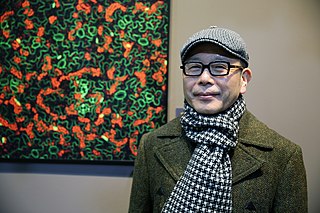
Hong Gil Nam is a South Korean biologist teaching in the Department of New Biology of Daegu Gyeongbuk Institute of Science and Technology and leading research as director of the Center for Plant Aging Research. His research interests include comparative aging in diverse kingdoms,including plant and animals,to reveal aging mechanisms among species,cross-kingdom interaction between plants and animals,and biochemistry at nano and micro levels. He is the founder and former director of the Biological Research Information Center,a member of the Korean Academy of Science and Technology,and has served on the editorial board in Molecular Plant since 2013.
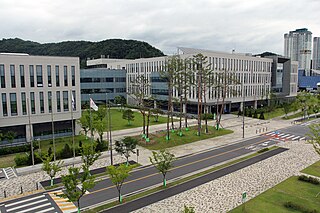
The Institute for Basic Science is a Korean government-funded research institute that conducts basic science research and relevant pure basic research. Comprising approximately 30 research centers with more than 60 research groups across the nation and a headquarters in Daejeon,IBS has approximately 1,800 researchers and doctoral course students. Around 30% of the researchers are from countries outside South Korea. The organization is under the Ministry of Science and ICT.

Koh Gou Young is a researcher from South Korea studying organ vasculature and lymphatic vessels with an interest in angiogenesis,lymphangiogenesis,adipogenesis,and cardiogenesis. His research has contributed to the publication of more than 200 journal articles,including multiple publications on how Tie2 deficits are related to sepsis,blood-retinal barrier damage,and an imbalance of intraocular pressure in Schlemm's canal which induces glaucoma.

Jun-Muk Hwang is a South Korean mathematician,specializing in algebraic geometry and complex differential geometry.

Noh Do Young is a South Korean physicist specializing in condensed matter physics and materials science using synchrotrons and XFELs. He has developed and applied various frontier X-ray diffraction methods to study condensed matter systems,including recent coherent X-ray diffraction imaging technique. His research has utilized a number of synchrotron radiation facilities,such as Advanced Photon Source,SPring-8,National Synchrotron Light Source,PLS,and X-ray free electron lasers,including SCALA and PAL-XFEL.
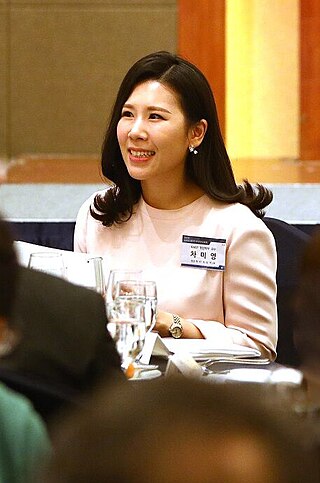
Cha Meeyoung,sometimes known as Mia,is an associate professor at KAIST in the School of Computing and a chief investigator in the Pioneer Research Center for Mathematical and Computational Sciences at the Institute for Basic Science. Her research focuses on network and data science with an emphasis on modeling,analyzing complex information propagation processes,machine learning-based computational social science,and deep learning. In June 2024,she will become the scientific director of the Max Planck Institute for Security and Privacy. She has served on the editorial boards of the journals PeerJ and ACM Transactions on Social Computing.
Kuk Young is a South Korean physicist,former physics professor and vice-provost of research of Seoul National University,distinguished professor of Ewha Womans University,and chairman of the Samsung Science and Technology Foundation. He is a fellow of the American Physical Society,Korean Academy of Science and Technology,Institute of Physics,Korean Physical Society,and Korean Vacuum Society. He has performed editor roles for the journals Nanotechnology,ACS Nano,and Solid State Electronics and is the fourth president of Daegu Gyeongbuk Institute of Science and Technology (DGIST).

Choi Kiwoon is a theoretical particle physicist researching focusing on particle theory and cosmology. He was a research professor at Chonbuk National University and a full professor at KAIST. He is the founding director of the Institute for Basic Science Center for Theoretical Physics of the Universe. He is a member of the Korean Academy of Science and Technology.
Scientist of the Year Award is one of several awards given in South Korea by the Korea Science Journalists Association. From 1985,it was awarded to one individual. From 1999,it was given to three winners,each within their own category,which changed to one category and one winner in 1996,removed the category system from 2011,and allowed multiple winners the following year. Laureates receive a medal and 3 million KRW cash prize.

Kim Doochul is a South Korean theoretical physicist. He was head of the Department of Physics,director of the BK21 Physics Research Division,and professor emeritus at Seoul National University. He was also a fellow and chairperson in the Korean Academy of Science and Technology before becoming the fifth president of Korea Institute for Advanced Study and the second president of Institute for Basic Science. He was a standing trustee with the Asia Pacific Center for Theoretical Physics and a board of Trustee member of the Korean Physical Society.

Changjoon Justin Lee is an American neuroscientist specializing in the field of glioscience. He served as the Director of Center for Neuroscience at the Korea Institute of Science and Technology and later founded the WCI Center for Functional Connectomics as part of the World Class Institute Program. In 2015,he established the Center for Glia-Neuron Interaction before becoming co-director of the IBS Center for Cognition and Sociality and head of the Cognitive Glioscience Group in 2018. He has been on the editorial boards of the journals Molecular Brain and Molecular Pain and is a chief editor of Experimental Neurobiology.
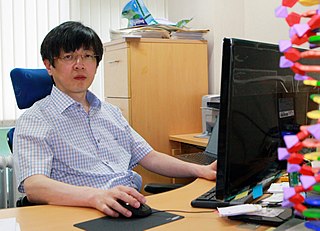
Kim Jin-Soo is a chemist,biologist,and entrepreneur. He was CEO and CSO,ToolGen,Inc.,is a professor in the Department of Chemistry of Seoul National University and director of the Center for Genome Engineering. His research team has developed and improved several types of programmable nucleases,specifically zinc finger nucleases (ZFNs),TAL effector nucleases (TALENs),and RNA-guided engineered nucleases (RGENs). In 2018,he was a Clarivate Analytics Highly Cited Researcher in the cross-field category and in the biology and biochemistry category in 2019.

Oum Sang-il is a Korean mathematician working in graph theory and discrete mathematics. He is a tenured professor in the Department of Mathematical Sciences at KAIST and the chief investigator of the Discrete Mathematics Group in the Pioneer Research Center for Mathematical and Computational Sciences at the Institute for Basic Science. He is known for his work on structural graph theory and in particular for structures and algorithms relating to rank-width,clique-width,and branch-width. He published more than 45 journal papers.
The Young Scientist Award is a Korean award for young scientists under the age of 40 with research and development achievements in the natural sciences and engineering fields. Four recipients are selected on an annual basis. While the award is organized by the Korean Academy of Science and Technology,it is given on behalf of the president of Korea and comes with prize money of initially KRW 30 million and later KRW 50 million. Candidates for the award must be Korean or working within Korea at a university or research institute. The award is presented to natural science researchers in even-numbered years and engineering in odd-numbered years.
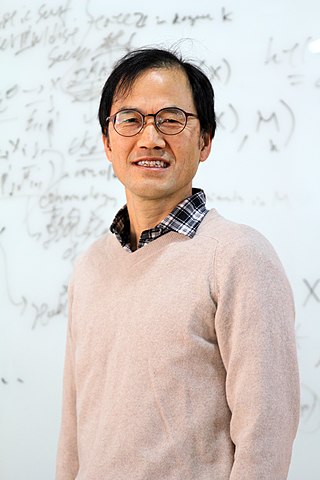
Oh Yong-Geun is a mathematician and distinguished professor at the Pohang University of Science and Technology and founding director of the IBS Center for Geometry and Physics located on that campus. His fields of study have been on symplectic topology,Floer homology,Hamiltonian mechanics,and mirror symmetry He was in the inaugural class of fellows of the American Mathematical Society and has been a member of Institute for Advanced Study,Korean Mathematical Society,and National Academy of Sciences of the Republic of Korea and is on the editorial boards of Journal of Gokova Geometry and Topology and Journal of Mathematics of Kyoto University.
The Korea Engineering Award is an award presented to South Koreans and Korean engineers working in domestic universities or research positions. It is currently jointly presented by the Ministry of Science and ICT and the National Research Foundation of Korea. Research achievements are limited to that of a single project conducted in Korea. Potential recipients go through a several stage review which includes consolation with foreign scholars. It is given annually to up to four individuals and is presented with the Korea Science Award. Prize money of KRW 30 million is given in addition to the award.
Top Scientist and Technologist Award of Korea (Korean: 대한민국최고과학기술인상) is one of two annual awards given in South Korea by the Korean Federation of Science and Technology Societies with the other being a government award for contribution to science and technology promotion. The Top Scientist and Technologist Award of Korea was started in 2003 as the successor to the Science and Technology Award of Korea which was established in 1968. The award is to foster honor and pride and create an environment in which people can focus on research and development by discovering and encouraging scientists and engineers with outstanding achievements who can represent South Korea. While previously given to multiple individuals,from 2003 only person is selected for each cycle. Laureates receive the award and 300 million KRW cash prize.

Kim Jae Kyoung is a biomedical mathematician and associate professor at KAIST in the Department of Mathematical Sciences and a chief investigator in the Pioneer Research Center for Mathematical and Computational Sciences at the Institute for Basic Science. His research focuses on mathematical biology and medicine,specifically the combination of nonlinear dynamics,the theory of stochastic processes,and computational science,to better understand disease mechanisms and develop relevant treatment strategies,including drug and digital medicine for sleep disorders.
References
- 1 2 류준영 (31 October 2013). "IBS 연구단 '예산 몰아주기'…국가과학자 사업 역차별". 머니투데이 (in Korean). Retrieved 17 November 2023.
- ↑ 기자명 (24 June 2005). "황우석 교수, '제1호 최고과학자'". HelloDD (in Korean). Retrieved 17 November 2023.
- ↑ 안창욱 (26 June 2005). "황우석 교수 '최고 과학자' 1호로 선정". Medical Time (in Korean). Retrieved 17 November 2023.
- ↑ 홍성익 (24 August 2006). "정부, 올 '국가과학자' 2명 선발". 의학신문 (in Korean). Retrieved 17 November 2023.
- ↑ 배태웅 (7 September 2021). "바이오벤처 신약R&D 맡은 '국가과학자 1호' 신희섭 박사". The Korea Economic Daily (in Korean). Retrieved 17 November 2023.
- ↑ "[보도자료]POSTECH 김광수·남홍길 교수, '국보급' 국가과학자 선정". Pohang University of Science and Technology (in Korean). 29 April 2010. Retrieved 17 November 2023.
- ↑ 김청한 (13 May 2010). "대한민국 이끌 8명의 국가과학자: 안병만 장관, 11일 '국가과학자 지정서' 수여". The Science Times (in Korean). Retrieved 17 November 2023.
- ↑ 이준기 (31 August 2023). "세계 최고 분자생명·뇌과학 분야 연구리더, IBS 본원에 새 둥지". 디지털타임스 (in Korean). Retrieved 17 November 2023.
- ↑ 박정연 (31 August 2023). "IBS, 생명과학 클러스터 내 신규 연구단장 2인 선임: 구본경 유전체교정연구단장·강봉균 인지및사회성연구단 공동단장 선임". Donga Science (in Korean). Retrieved 17 November 2023.
- ↑ "김승우 교수, 국가과학자 선정". KAIST (in Korean). 28 August 2012. Retrieved 17 November 2023.